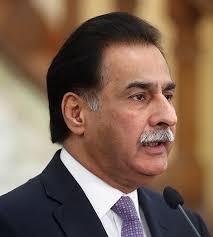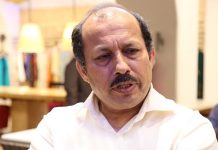
Before adjourning the session on Tuesday, the district and sessions judge insisted that the transfer decision was made by his predecessor, and asked how could he revise that. In his response, Hafeez’s counsel Advocate Asad Jamal quoted the relevant law and said that the court was empowered to take such decisions in the interest of justice and fair trial.
Deputy district public prosecutor Aziz Ahmed Tipu, who was assisting the court, also agreed with Jamal that the facts of the matter warranted cancellation of the transfer decision.
In his plea, Jamal had submitted that since the adjudication started in 2013, the case got transferred from one judge to another six times. The sixth judge to hear the case from May 2017 onwards, additional sessions judge Muhammad Abbas, was now being transferred to a different court in the Multan sessions division, he said.
During the hearing on Tuesday, Advocate Jamal told the court that since May 2017, Judge Abbas presided over recording of crucial evidence including the statement of star prosecution witness Muhammad Saleem, an IT expert with Multan police, who investigated and collected alleged electronic and digital evidence against Hafeez.
Jamal pleaded that since the case had been categorised as a direction case [which must be heard and concluded without any delay], judge Muhammad Abbas should be allowed to adjudicate it since he is aware of the facts as well as the demeanour of witnesses cross examined.
“If the case is transferred to a different judge who is totally stranger to the specific details at a stage when partial examination of the last prosecution witness remains, the quality of adjudication will suffer and there is reasonable apprehension of miscarriage of justice,” he said.
Referring to the relevant law [Section 528 of the Criminal Procedures Code], Jamal further argued that the cases partly heard by a judge could not be transferred to a different judge. He said the administrative power of recalling a case from a judge should not be exercised by the court in such instances.
“This principle is to ensure speedy trial and hearing. A case ceases to be part-heard only when the judge trying the case retires, resigns, dies or is transferred out of the Sessions Division and the court becomes vacant. But where the Additional Sessions Judge is transferred within the Sessions Division or is on leave or under suspension, the restriction over the administrative power under Section 528 continues to exist.”
What does the law say: Section 528 of the Code of Criminal Procedures deals with the Sessions Court’s discretionary power to withdraw cases from judges. It reads: “(1) Any Sessions Judge may withdraw any case from, or re-call any case which he has made over to, any Assistant Sessions Judge subordinate to him. (1-A) At any time before the trial of the case or the hearing of the appeal has commenced before the Additional Sessions Judge, any Sessions Judge may re-call any case or appeal which he has made over to any Additional Sessions Judge. (1-B) Where a Sessions Judge withdraws or re-calls a case under sub-section (1) or recalls a case or appeal under sub-section (1-A), he may either try the case in his own Court or hear the appeal himself, or make it over in accordance with the provisions of the Code to another Court for trial or hearing, as the case may be. Part-heard case cannot be heard by another judge when the judge who has part heard the case is a judge in the same sessions division.” Under adjudication since 2013
The allegations against Hafeez were first heard by additional sessions judge Shahbaz Paracha till he was transferred out of the Sessions Division of Multan in December 2014. Additional Sessions Judge Muhammad Asif then took over the case but he could not conclude trial in the two years he spent at the Multan Sessions Division before his transfer in December 2016.
In 2017, the case was transferred from one judge to another four times before it was assigned to Judge Abbas.
Published in Daily Times, January 24th 2018.














